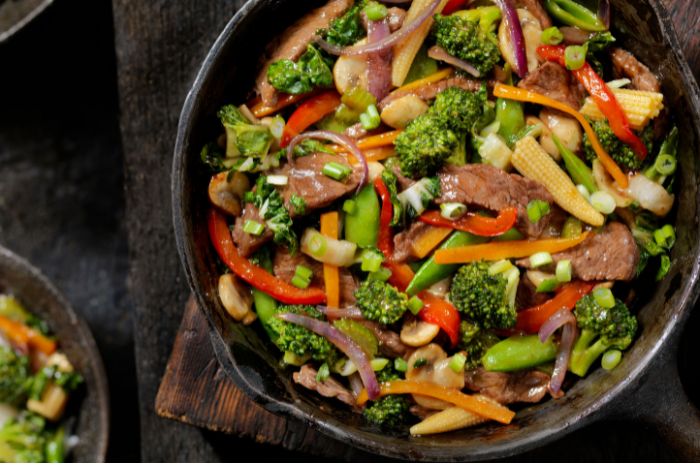Corned Beef Nutrition Facts and Health Benefits
How well do you know your favorite comfort food? Corned beef has made a name for itself as an iconic ingredient in Irish and American cuisine.
Table of Contents
If you love salt, spice, and everything nice—then you’re sure to fall in head-over-heels for corned beef!

| Read: Is Salsa Healthy To Eat? Know 5 benefits!
Corned beef has been around for centuries and was originally created as a way to preserve meat before the advent of refrigeration.
In Ireland, corned beef was often eaten as a cheaper alternative to bacon. Today, corned beef is enjoyed all over the world and is a staple of many cultures.
While it may be delicious, you may be wondering—what exactly is in corned beef? Is it healthy? Let’s take a closer look at the nutrition facts and health benefits of this tasty treat.
See just how beneficial this savory treat can be with this detailed look into its nutrition facts and health benefits.
Also, learn how to include corned beef in your diet while still getting the most out of each bite!
In this article, we provide a full breakdown on corned beef’s nutrition facts and its associated health benefits.
What is corned beef?
What comes to mind when you think of corned beef? Whether it’s in a sandwich or part of a robust Irish-themed meal, corned beef is an internationally sought-after food.
Corned beef is a delectable dish made by pickling beef in a solution of water, salt, and spices. The curing process not only adds flavor but also helps to preserve the meat.
Corned beef is made from brisket or the lower chest of a cow. It can also be made from other meats, such as veal.
Brisket is a cut of meat from the breast or lower chest of a cow that has been salted and this beef brisket is cured for several days to several months before being used as corned beef (also called pickled beef).
Nutritional facts of corned beef
Corned beef is a popular food item, especially around St. Patrick’s Day. It is typically made from beef that has been cured in a salt and water solution, and often includes spices such as bay leaves and peppercorns.
While it may be delicious, you may be wondering about the nutritional content of corned beef. Here is a look at some of the key nutrients in corned beef, as well as some potential health benefits associated with eating this food.
A 3-ounce (85-gram) cooked portion of corned beef provides.
- Calories: 213
- Protein: 15 grams
- Fat: 16 grams
- Carbs: 0 grams
- Sodium: 827 mg, 34% of the Daily Value (DV)
- Cholesterol: 83 mg, 28% of the DV
- Selenium: 27.9 mcg, 40% of the DV
- Vitamin B12: 1.6 mcg, 27% of the DV
- Iron: 1.86 mg, 10% of the DV

| Read: 10 Worst Food For Immune System
Health benefits of eating corned beef
Everyone knows that eating healthy is essential to a long and healthy life. But with the sheer amount of different foods out there, it can be difficult to know which ones to choose.
Corned beef is a high-sodium food that should be consumed in moderation, but it has health benefits too.
The salt content can make it problematic for some people with hypertension and heart disease, but if you’re eating the meat moderately, it’s an excellent source of protein and iron—and a good way to get calcium into your diet.
There are many health benefits associated with eating corned beef. For one, corned beef is a good source of protein and iron.
- It’s an excellent source of protein and iron.
Protein is essential for muscle growth and repair, while iron helps to transport oxygen to the cells. Protein is also important for healthy hair, skin, and nails, as well as the production of hormones.
Iron is essential for the transportation of oxygen in your blood cells; it helps with growth and development at every stage of life.
It’s also important for maintaining a healthy immune system, especially if you have anemia or another condition that causes low amounts of red blood cells (such as chronic liver disease).
Note: Some other foods that contain both protein and iron are – eggs; chicken breast without skin; sardines; beans (lima beans); tofu; spinach
- It has a variety of vitamin and mineral content.
Corned beef is a good source of vitamins and minerals, like Vitamin B12, iron, zinc, and calcium. Vitamin B12 is important for the formation of red blood cells and the production of DNA (the genetic code). Iron helps your body make hemoglobin that carries oxygen around your body in the bloodstream.
Zinc helps produce proteins within cells that are needed for cell growth and repair processes throughout life. Calcium builds strong bones while potassium keeps nerves healthy
- It can be good for the heart.
Corned beef is high in protein and has been shown to reduce cholesterol levels, which can help prevent cardiovascular disease ( heart disease).
- It’s good for muscle growth.
We know that eating meat plays a role in muscle growth and strength but how much?
A study done by researchers at the University of Nebraska Medical Center found that eating 2 ounces (57 g) of cooked lean corned beef per day significantly increased lean body mass over a period of six weeks compared to participants who had no additional dietary changes during this time frame.
This means that if you’re looking to gain some extra muscle mass or tone up your physique, adding this food group into your diet could be one way forward!
- It keeps our brains sharp.
A study published in the Journal Of Nutrition And Food Sciences showed how consuming fatty acids from fish oils helped protect brain cells from damage associated with aging.
Corned beef contains fatty acids and all the essential nutrient.
- It contains zinc, which helps to prevent osteoporosis.
Zinc is an essential mineral that plays a part in many significant physical functions. It’s found in beef, and it helps to prevent osteoporosis.
Zinc is involved in the absorption of calcium from your diet and from bones. When you have more zinc in your system, it can help with the absorption of other minerals like iron or magnesium as well.
In addition to being an important part of many different bodily processes, zinc also protects against heart disease by reducing blood pressure levels and reducing cholesterol levels (1).
- It can aid in weight loss.
It helps to maintain weight. The fat content of corned beef also helps with weight management, helping you feel fuller longer after eating it.
The high-protein and low-calorie content make it an ideal food for people who are trying to lose weight.
- Keeps body energized.
Corned beef is also rich in iron, zinc and vitamin B12, which all play a role in keeping your body healthy and energized.
Corned beef is also a good source of B-vitamins, which are essential for energy production.
If you’re looking for something more substantial than tofu or tempeh that’s still vegan-friendly, try adding some corned beef on top of your salad or sandwich!
Note: Additionally, corned beef contains conjugated linoleic acid (CLA), which has been shown to have various health benefits, including reducing inflammation and lowering cholesterol levels.

| Read: 5 Best Diet For Menopause
Some harms of eating corned beef
- The sodium content can make it problematic for some people with hypertension.
Sodium content can cause high blood pressure, and it’s present in corned beef.
Limit sodium intake to no more than 2,300 mg per day (1/2 teaspoon).
Check the nutrition label on any corned beef product before buying it for the best information about its sodium content.
Corned beef is a high-sodium food that should be consumed in moderation.
Excessive salt intake can cause high blood pressure and stroke along with other health problems.
- The Calcium content can increase the risk of kidney stones.
Although consuming too much calcium can increase your risk of kidney stones (and possibly other complications), eating moderate amounts of this mineral will help keep your bones strong as they grow during childhood and adolescence when they’re developing into adulthood.
Note: A study found that women who ate more dairy products had lower rates of osteoporosis compared to women who consumed less than one serving per day—so if you’re looking for ways to strengthen bones naturally then perhaps consider incorporating some cheese into your meals every so often!
- It is red meat, and daily consumption of 2 ounces can lead to colorectal cancer.
The WHO classified corned beef as a potential carcinogen. Eating it regularly can increase the chances of colorectal cancer. Though, for health benefits, moderate consumption is advised.
Note: Processed meat consumption increases the chances of cancer.
Different ways to cook and enjoy corned beef
There are many different ways to cook and enjoy corned beef. Here are some of the most popular methods:
- Slow Cooker: This is one of the easiest ways to cook corned beef. Simply place the beef in a slow cooker with some water or broth, and let it cook on low for 3-4 hours, or until the beef is cooked through.
- Oven Roasting: Preheat your oven to 350 degrees Fahrenheit. Place the corned beef in a roasting pan, cover it with foil, and roast for 2-3 hours, or until the beef is cooked through.
- Stovetop Simmering: Place the corned beef in a large pot or Dutch oven with water or broth, and bring it to a simmer over medium heat. Let it simmer for 2-3 hours, or until the beef is cooked through.
- Pressure Cooker: This is one of the quickest ways to cook corned beef. Simply place the beef in a pressure cooker with water or broth, and cook it on high pressure for 60 minutes.
No matter how you choose to cook your corned beef, be sure to let it rest for 10-15 minutes before slicing and serving. Enjoy!

| Read: What Are 5 Low-Glycemic Foods? Defination, Examples, Facts, Benefits
Tips for making healthy, delicious meals with corned beef
When it comes to corned beef, there are a few things you should keep in mind in order to make the most delicious and healthy meals possible.
1. First of all, be sure to cook the corned beef until it is Fork-tender.
This will ensure that the beef is not only cooked through but also that it is full of flavor.
2. Secondly, use low-sodium broth or water when cooking the beef.
This will help to keep the sodium content down and prevent your meal from being too salty.
3. Finally, consider using fresh or frozen vegetables in your corned beef dishes.
These will add color, flavor, and nutrients to your meal without adding any extra calories or fat.
Conclusion
In conclusion, corned beef offers a great opportunity to enjoy an Irish-inspired delicacy while also increasing your intake of important nutrients.
Corned beef is a high-sodium food that should be consumed in moderation, but it has health benefits too.
The sodium content can make it problematic for some people with hypertension, but it’s still a good choice if you’re looking for something to add to your diet.
Corned beef is an excellent source of protein and iron and can be good for the heart.
It can also help with weight loss because it contains zinc and calcium which have been shown in studies to help reduce fat deposits in specific areas such as around hips.”
Whether you choose to consume it as part of a traditional St. Patrick’s Day meal or incorporate it into your weekly routine of healthy dishes, incorporating this nutrient-dense food is sure to be beneficial for both your physical and mental health.
So don’t forget about corned beef the next time you plan on spicing up your meals!


